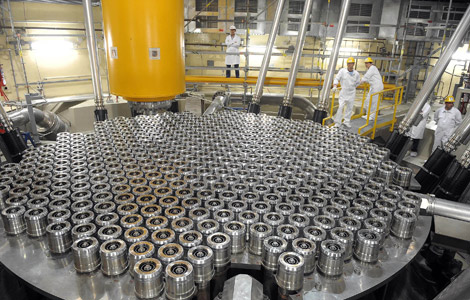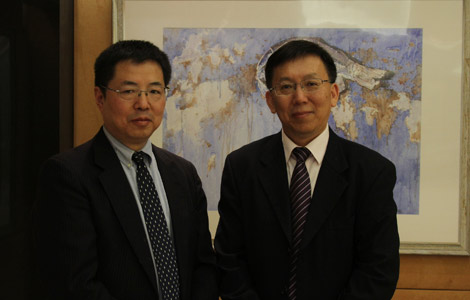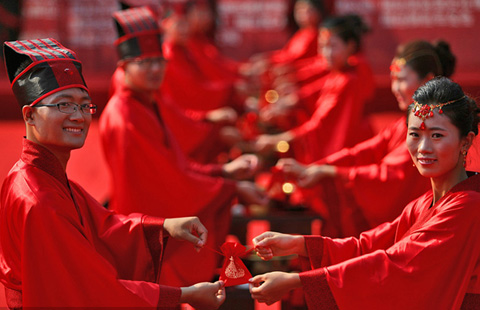US group seeks 'no vacancy' for China's hotels
Updated: 2014-09-22 04:28
By ZHENG XIN in Beijing(China Daily USA)
|
||||||||
Names like Hilton, Marriott and InterContinental are known around the world for being luxury hotels. Now independent hotels in China are trying to get out from under their shadow and capture part of the international tourist market by promoting their first-class services and facilities.
"Unlike flag-chain and global giant hotels, most of the independent hotels in China are very popular with local customers, but they are barely known by visitors from abroad," said Yang Chen, director of sales and marketing at Hotel Kunlun in Beijing. "It's a mission impossible for a single property, independent hotel to have staff and office globally for overseas promotion, sales and marketing."
Independent hotels have found an answer to reach that audience abroad – the Chicago-based Preferred Hotel Group. The hotel alliance consists of more than 650 independent hotels and resorts in over 85 countries. The alliance does not own, operate or manage any of the hotels, but promotes them globally to increase sales.
Blaise Jing, regional director of global sales for Preferred Hotel Group in Beijing, said the company signed up another 41 hotels worldwide in the first half of 2014, six of them in the Chinese mainland, bringing the total number of member hotels there to 22.
"The first half of this year has seen a 52 percent increase in the number of reservations for the member hotels in China," he said.
With each of its member hotels offering a unique setting, design and array of amenities, the group offers travelers a limitless variety of destinations and hotel styles to choose from, said Anthony Ross, executive vice-president of the organization's Asia Pacific, Middle East and Africa sectors.
"Big and independent hotel companies in China are really good and very successful taking care of the domestic market," he said. "The major problem for independent hotels in China is that despite world-class facilities, most lack the channels and capabilities to attract international tourists."
And that restricts their further development in the global market, he added.
Unlike major hotel chains, many successful hotel developers don't want to surrender their control or assets to a hotel management company. Yet they still need to reach global audiences.
"We can provide those independent hotels with marketing and sales channels for them while promoting their brand recognition worldwide without massive fees," Ross said.
Yang said his hotel joined the alliance in 2004 and since then the percentage of foreign occupancy has increased to more than 45 percent from around 30 percent. The 29-storey hotel opened in 1986, has 575 rooms, with an average daily room rate or 1,016 yuan ($165).
"Their connections, staff and worldwide offices play a key role in enhancing the local hotel's brand, marketing and sales abroad, which we barely reach as a domestic hotel," he said. "Many of the clients are from the world's top 500 companies, and the signing rates are pretty impressive as well."
The hotel alliance also sends teams of consultants to educate and coach the hotels on how to attract more foreign people, he said, and endorses hotels in terms of quality to clients.
"We first came to China around 2007 and we were pretty unknown, but with the surge of China's middle class and increase in Chinese tourists, there was the realization that we needed to be known in China," he said.
Ross said the alliance has added offices and staff in China during the past six months, and is preparing to increase staff in the next six to 12 months, to help sell the independent hotels domestically and abroad.
"It's going to be a trend for those fine-quality independent hotels to join an alliance to better promote their brand recognition worldwide," said Ross. "Visitors can explore hotels of different features without worrying about the service and facility quality."
The huge increase in Chinese hotels is due to the country's rapid growth and the expansion of the middle class, according to Ross.
In addition to working with China's independent hotels, Preferred Hotel Group also helps independent hotels abroad to attract Chinese outbound travelers with such offerings as visits to game reserves, accommodations at five-star city-center hotels and tree-house style jungle retreats.
"The number of Chinese outbound tourists is amazing, some 100 million tourists now and going to reach 200 million soon, which is just huge," Ross said. "We want to make a noise in China so that people know about us, so that when they think of traveling overseas they also think about us."
zhengxin@chinadaily.com.cn

 Tens of thousands crowd NY streets for climate march
Tens of thousands crowd NY streets for climate march
 China invests $2b in Argentina's nuclear power plant
China invests $2b in Argentina's nuclear power plant
 Folk activity 'walking on fire' staged in E China
Folk activity 'walking on fire' staged in E China
 Chinese naval fleet arrives in Iran for visit
Chinese naval fleet arrives in Iran for visit
 Art exhibition unveiled at Chinese embassy in NY
Art exhibition unveiled at Chinese embassy in NY
 Intl Dragon Boat Festival kicks off in San Francisco
Intl Dragon Boat Festival kicks off in San Francisco
 China wins gold in synchronized swimming duets at Games
China wins gold in synchronized swimming duets at Games
 Couples tie the knot in traditional group wedding
Couples tie the knot in traditional group wedding
Most Viewed
Editor's Picks

|

|

|

|

|

|
Today's Top News
US group seeks 'no vacancy' for China's hotels
Rio expo gives China a showcase for its oil industry
Alibaba makes IPO history
Security breach prompts more White House security
Man arrested for charging White House had knife
US, Canadian jets intercept 8 Russian aircraft
Li seeks to fast track green cards in FTZ
Fence-jump intruder sparks White House alert
US Weekly

|

|







